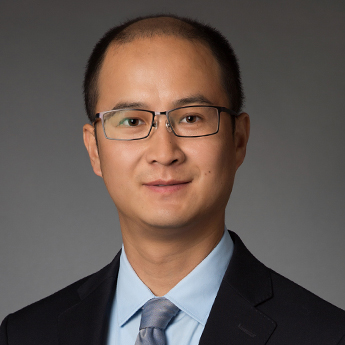Using Medical Physics to Focus on Patients
Radiation therapy using protons is being substantially enhanced by breakthroughs from the UF Health Proton Therapy Institute researchers in the field of automated treatment verification. Yawei Zhang, PhD, medical physicist and associate professor in the Department of Radiation Oncology at the UF Health Proton Therapy Institute, leads some of this cutting-edge research. Through this research, the team is finding ways to improve patient safety and increase efficiency from the beginning to the end of the radiation treatment experience.

Dr. Zhang and the research team awarded Smith Award
Dr. Zhang recently shared an exciting development within their research team. "I’m thrilled to share that our project, 'Automated Treatment Plan Integrity Verification for Proton Radiation Therapy: Enhancing Error Detection and Workflow Efficiency,' has been awarded the prestigious W. Martin Smith Interdisciplinary Patient Safety and Loss Prevention Award and will receive $23,000 to support the project. This funding is a significant milestone and a testament to the collaboration and dedication of each team member. We can now proceed as planned and initiate the next phase of our work. Thank you all for your contributions. I’m looking forward to continuing this journey with you."
Q&A with Dr. Zhang
What is the role of a medical physicist at the UF Health Proton Therapy Institute?
A qualified medical physicist at UF Health Proton Therapy Institute is essential in reviewing radiotherapy treatment plans and ensuring the delivery process's technical accuracy, quality and safety. This involves thoroughly checking the treatment plans and associated charts to guarantee radiation therapy is administered correctly, adhering to the highest standards of patient care.
What is the recent project for which you were awarded the W. Martin Smith Award?
Our recent project focuses on automating part of the treatment plan verification process, making it faster and more efficient. Most radiation treatment plan reviews are manually intensive and time-consuming. The project aims to develop and implement Auto-IniCheck, a new automated technique. This tool uses computational protocols to verify the integrity of treatment plans, ensuring there are no errors before doctors approve them. This innovation is expected to make the review process more efficient, reducing errors that might be overlooked during manual checks. These improvements will ultimately enhance the safety and quality of proton therapy treatments. As proton therapy continues to advance, it is crucial that we integrate tools like Auto-IniCheck to ensure ongoing safety and effectiveness.
How will you measure the success of this project and research?
There are several key indicators that we will use to measure the success of this project:
- Efficiency Gains: We aim to reduce the time required for the initial proton therapy plan check process.
- Error Detection: We expect to see an increased rate in identifying errors that could have been missed during manual reviews.
- User Feedback: We will gather input from clinical users on the tool's effectiveness in streamlining the review process and improving plan quality.
- Versatility: The system should be able to handle a diverse range of proton therapy plans across different patient populations.
- Workflow Integration: The successful incorporation of Auto-IniCheck into the clinical workflow will be a crucial success indicator.
- Patient Safety: We aim for the tool to positively impact patient safety outcomes.
Congratulations to Dr. Zhang and the entire team on this award. We look forward to seeing the advancements in patient care and safety that result from your dedication and research.
Find out more about the W. Martin Smith Interdisciplinary Patient Safety and Loss Prevention Award.
